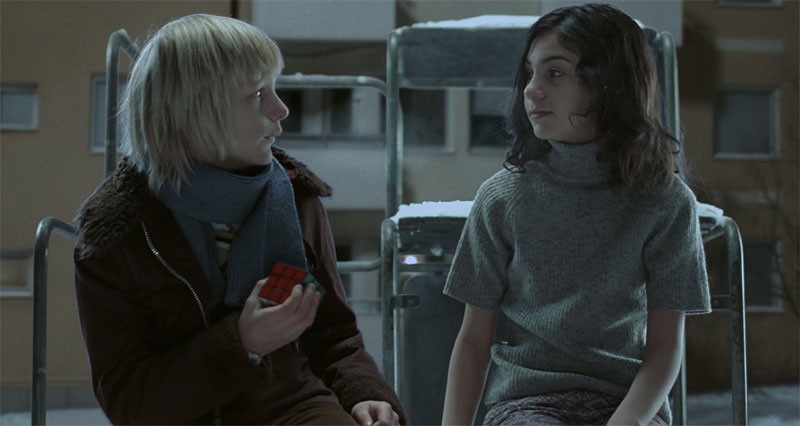Let the right one in
2008

Rated: R
Genre: Horror, Romance
Country: Sweden
Run-Time: 1 h 54 min
Director: Tomas Alfredson
Cast
Kare Hedebrant…………….Oskar
Lena Leandersson…………Eli
Per Ragnar………………………..Hakan
2008 was a big year in film for adolescent vampire romances. For fans of Stephanie Meyer’s Twilight series, the year is remembered for delivering the first entry in the epic vampire-fantasy franchise about Bella and Edward…and later Jacob. But for horror fans, the vampire romance that was forever immortalized in celluloid was that of Oskar and Eli…and Hakan, the central characters in Tomas Alfredson’s classic Let the Right One In.
Based on the Swedish novel Let the Right One In by John Ajvide Lindqvist, Alfredson tells us the story of Oskar, a bullied twelve-year-old boy who lives with his mother in a lower income apartment community. Is does not take long for audiences to see that Oskar is socially awkward and odd in the kind of way that suggests he may be hiding dark psychological secrets. One night, while passing his time alone, lurking about the complex’s courtyard, he meets his new neighbour, Eli, a mysterious girl who also happens to be a vampire. But unlike the Twilight series, the pairing of Oskar with Eli poses an actual threat to the humans in community and leaves you wondering about the moral implications of this union.
–At this point, I should mention that Let The Right One In also inspired an American remake called Let Me In that is a very good film in its own right and that is also reviewed in the Movers section of the Midnight Selections. The two films are very similar in content, but differ in style, characterization, and thematic emphasis. For a better understanding of how they differ, check out my review of Let Me In.
One of the things that makes Alfredson’s film unique is the matter-of-fact way events unfold, providing us little melodrama or backstory. It is up to viewers to deduce the characters’ histories, quirks, and motives. We observe Hakan, Eli’s guardian-of-sorts, uncomfortably avoiding community neighbours. We observe Oskar’s (played by Kare Hedebrant) morbid fascination with violent crimes and his spontaneous revenge fantasy improve sessions. And we observe Eli (played by Lena Leandersson), who is obviously too under-dressed for her late-night forays into the frigid surroundings. In Let the Right One In, Alfredson is far more interesting in showing than explaining, forcing viewers to act as their own moral compass as events unfold. And since we never really get to view characters at their finest moments, Alfredson’s style shrouds the film in a tonally bleak form of pessimism.
Also layered into Alfredson’s film is a subtle transgendered subtext, underscored by one blink-and-you-missed-it scene that its American counterpart opted to ignore- but admittedly, the film’s unassuming style means you may need to be somewhat familiar with the book to fully understand the context. But when viewing the film in light of this subtext, it becomes a lot easier to sympathize with Oskar’s almost boundless acceptance of all of Eli’s revelations, even if it also leaves you pondering how much Eli truly acts as a catalyst for the menacing future Oskar chooses.
Unlike Let Me In, Alfredson’s film also has a subplot concerning the other members in complex community, which helps us to better understand the disruption caused by living in close proximity to a vampire. Also, in only Alfredson’s film will you be provided an answer for why vampires don’t like cats.
By a relatively thin margin, Let the Right One In is the better movie based on Lindqvist’s novel, though I admit I am still quite fond of the American remake. (Soon, there will be a television show as well.) Though the Hollywood film is better at establishing Eli’s motives as more of a broader pattern, the Swedish version benefits by being more edgy in terms of tone and characterization. It also is much better at developing the connection between the lonely outcasts and keeping it the film’s central focus. The chemistry between Hedebrant and Leandersson is stronger in this film, and as a result Oskar is easier to sympathize with despite being the more damaged protagonist. But most importantly, this is the film responsible for putting some bite back into vampire romances. At its core, Let the Right One In may simply be yet another story about a relationship between a human and a vampire, but at least it reminds us that if such a relationship were plausible, it would not be glamorous.
